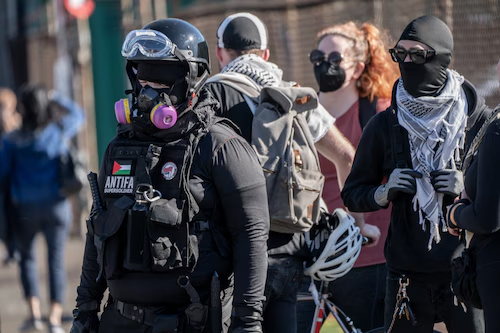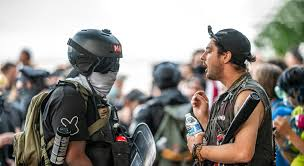Domestic terrorist organization designations have always been a sensitive and controversial matter in American politics. While foreign terrorist groups are often labeled with relative consensus, applying the same standard to groups inside the United States carries heavier consequences. When a domestic group is officially labeled a terrorist organization, it does not just affect security operations; it shakes the foundations of political discourse, civil liberties, and national unity.
The fallout from such a decision is rarely confined to law enforcement. Instead, it ripples across the political landscape, sparking intense debates in Congress, forcing both parties to define their positions, and raising questions about the limits of government power in a democracy.
Why the Domestic Terrorist Organization Label Matters
Labeling a group as a domestic terrorist organization is not just symbolic—it comes with concrete legal consequences. Once a group is designated, its members and affiliates may face harsher prosecution, restrictions on funding, and increased surveillance. Law enforcement agencies gain broader authority to disrupt its activities, and financial institutions are compelled to block transactions connected to it.
But the most significant impact is political. In a country that prizes free expression and association, calling a homegrown group “terrorist” is seen by many as crossing a line. It raises concerns about government overreach, partisan weaponization of security powers, and the erosion of civil liberties.

Immediate Political Fallout
Whenever the government designates a domestic terrorist organization, the political reactions are swift. Leaders from the two main parties often clash over the justification for the move. Supporters argue that such designations are necessary to protect public safety, prevent violence, and uphold national security. Opponents warn of political motivations, selective enforcement, and threats to constitutional rights.
The fallout is most visible in three areas:
- Congressional debates: Lawmakers spar over whether the group’s actions truly meet the threshold for terrorism or whether the label was applied selectively.
- Public opinion: Polling often reflects deep divisions, with some Americans applauding strong action against extremism while others fear the government could target movements they support.
- Legal challenges: Civil liberties organizations frequently step in, filing lawsuits that question whether the designation violates First Amendment protections or due process rights.
Bipartisan Responses: Conflict and Cooperation
Despite partisan divisions, labeling a domestic terrorist organization sometimes sparks bipartisan responses. Lawmakers from both parties may agree that violence, regardless of ideology, must be condemned and addressed. Yet, agreement often fractures when it comes to which groups should be targeted.
- Republican responses: Conservatives often warn against labeling groups based on ideology, particularly when the groups in question are aligned with their voter base. At the same time, many Republicans call for tough action against violent left-wing groups or anarchist organizations.
- Democratic responses: Liberals generally support action against extremist groups, especially when linked to far-right ideologies. However, they often emphasize the need to protect civil liberties and prevent law enforcement from targeting peaceful activists under the same framework.
Occasionally, bipartisan consensus emerges when violence clearly threatens public safety, such as after attacks on government institutions or mass-casualty events. In such cases, both parties recognize the need for decisive action.
Historical Context of Domestic Terrorist Organization Designations
To understand the current debates, it is helpful to look back at history. The U.S. has long struggled with how to treat domestic extremist groups. From white supremacist organizations like the Ku Klux Klan to radical anarchist and left-wing militant groups, defining the line between protected speech and terrorism has always been fraught.
In recent decades, the issue has become more pressing with the rise of mass shootings, militia movements, and politically motivated violence. Each incident raises the question of whether current laws are adequate or whether stronger designations are needed.
For example:
- After the Oklahoma City bombing in 1995, pressure grew to label militia groups as terrorist threats.
- Following September 11, most attention shifted to foreign terrorism, leaving domestic threats under less scrutiny.
- In recent years, attacks linked to extremist ideologies have revived calls for broader use of the domestic terrorist organization label.
Civil Liberties Concerns
One of the greatest controversies surrounding domestic terrorist organization designations is their impact on civil liberties. Critics argue that:
- Freedom of speech is at risk: Political groups, even radical ones, have the right to express their views under the Constitution. Labeling them as terrorists may criminalize their speech.
- Selective enforcement can occur: Governments may target groups that oppose their policies, while ignoring violent actions from groups closer to their base of support.
- Chilling effects may spread: Activists fear that peaceful protest movements could be discouraged if the line between activism and terrorism becomes blurred.
Civil rights advocates insist that fighting violence must be balanced with safeguarding fundamental freedoms. Without careful oversight, the domestic terrorist organization label could become a tool of political suppression.
Security vs. Liberty: The Core Debate
At the heart of the political fallout is a core debate: How do we balance national security with the preservation of liberty? Advocates for strong counterterrorism measures argue that preventing violence and protecting lives must come first. Opponents counter that a democracy cannot sacrifice its freedoms in the name of safety without undermining its very foundation.
This tension is not new. It mirrors debates from the Cold War, the civil rights era, and the post-9/11 period. Each generation struggles to redefine the balance, and each political decision reshapes the boundary between freedom and security.

Media and Public Narratives
The media plays a central role in shaping how the public understands domestic terrorist organization labels. Headlines often highlight the government’s framing, but coverage quickly turns to partisan reactions. Talk shows, social media platforms, and news networks amplify the fallout, sometimes portraying the designation as either a bold step or a dangerous precedent.
Public narratives often follow partisan lines, with supporters framing the move as necessary for safety and opponents viewing it as a threat to liberty. Over time, these narratives influence voting behavior, trust in institutions, and the strength of political movements.
The Future of Domestic Terrorist Organization Labels
Looking forward, the debate over domestic terrorist organization designations is unlikely to fade. In fact, it may grow more intense as polarization deepens and violence linked to extremist ideologies continues. Several trends are likely to shape the future:
- Calls for clear criteria: Both lawmakers and activists are demanding clearer definitions of what qualifies as terrorism to prevent arbitrary designations.
- Judicial involvement: Courts will continue to play a role in determining whether designations overstep constitutional boundaries.
- Bipartisan reforms: Despite divisions, there may be room for bipartisan reform aimed at strengthening transparency and oversight.
- Public pressure: As new incidents of violence occur, public demands for action could push Congress and the executive branch toward more aggressive use of the label.
Conclusion
The political fallout from labeling a domestic group as a terrorist organization is profound. It sparks heated debates about security, liberty, and the proper role of government. While bipartisan responses sometimes emerge, they often reveal as much division as unity.
Ultimately, the question goes beyond law enforcement. It is about what kind of democracy the United States wants to be—one that prioritizes safety at all costs, or one that safeguards freedoms even in the face of risk. The answer will shape not just today’s policies but the future of political life in America.
Do Follow USA Glory On Instagram
Read Next – $100,000 H-1B Fee: Trump’s New Visa Policy Sparks Debate






